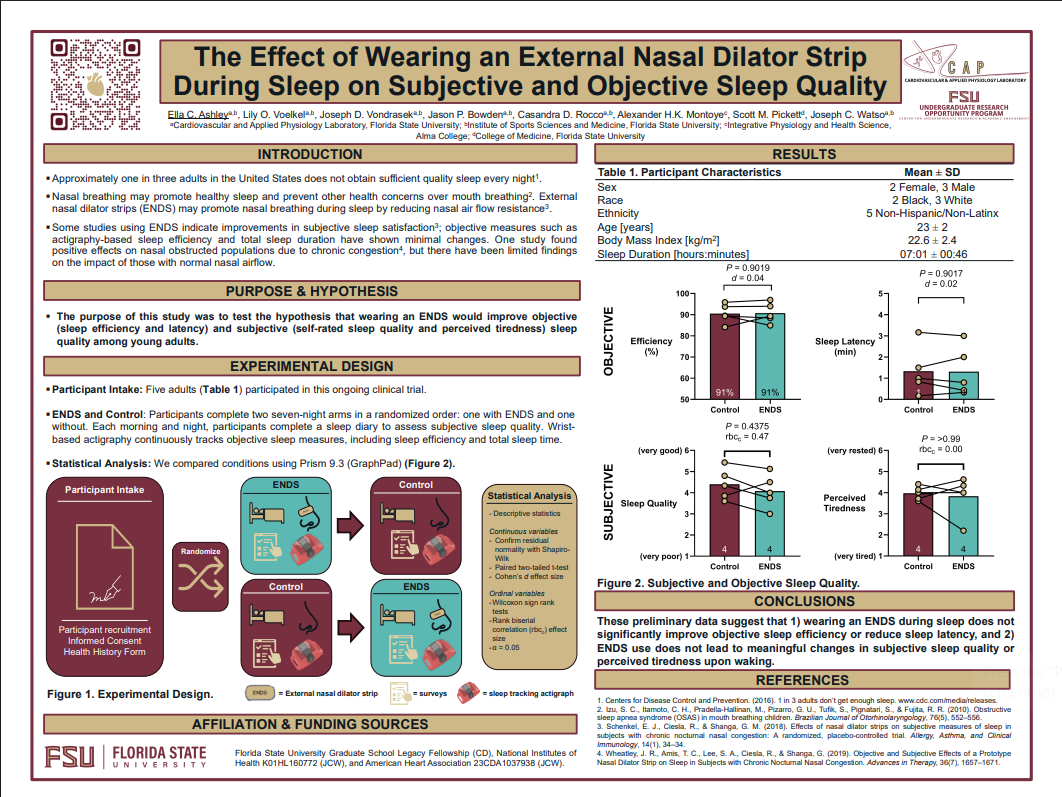Research Symposium
25th annual Undergraduate Research Symposium, April 1, 2025
Ella Ashley Poster Session 2: 10:45 am - 11:45 am/ Poster #103

BIO
I’m from Mandeville, Louisiana, and I’m majoring in Exercise Physiology. I plan to attend medical school and pursue a career in dermatology, with broad interests in medical research. Through UROP, I’ve been involved in research in the Cardiovascular Applied Physiology Lab, where I’ve enjoyed exploring the connections between physiology, health, and clinical outcomes. Outside of research, I serve on the executive board of the FSU Swim Club and volunteer teaching swim lessons to children with special needs—experiences that continue to shape my passion for health promotion and community engagement.
The Effect of Wearing an External Nasal Dilator Strip During Sleep on Subjective and Objective Sleep Quality
Authors: Ella Ashley, Joseph WatsoStudent Major: Exercise Physiology
Mentor: Joseph Watso
Mentor's Department: Department of Health, Nutrition, and Food Sciences Mentor's College: Anne Spencer Daves College of Education, Health, and Human Sciences Co-Presenters:
Abstract
According to the Centers for Disease Control and Prevention, approximately one in three adults in the United States does not obtain sufficient quality sleep every night. Previous research suggests nasal breathing is associated with improved sleep quality compared to mouth breathing, and external nasal dilator strips (ENDS) are designed to enhance nasal airflow by reducing airway resistance. ENDS have been proven to produce positive outcomes in chronic nasal-obstructed individuals; however, the effects on those with normal nasal airflow remain inconclusive. This study aimed to test the hypothesis that wearing ENDS would improve subjective (self-rated sleep quality and perceived tiredness) and objective (sleep efficiency and latency) sleep among healthy young adults. Five adults participated in this ongoing clinical trial including a control week (wearing only an actigraph) and two randomized experiential weeks: one with ENDS and one without. Each morning and night, participants completed a sleep diary to assess subjective sleep quality. Wrist-based actigraphy continuously tracked objective sleep measures, including sleep efficiency and total sleep time. We compared weekly averaged sleep efficiency and self-rated sleep quality between conditions using paired t-tests for normally distributed data and the Wilcoxon Signed-Rank Test for non-normally distributed data in Prism 9.3 (GraphPad). Results indicated no statistically significant difference in subjective or objective sleep measures between the control and ENDS weeks. This preliminary data suggests that wearing ENDS during sleep does not lead to meaningful changes in objective sleep efficiency or latency and subjective sleep quality or perceived tiredness upon waking.
Keywords: External Nasal Dilator Strip Sleep

